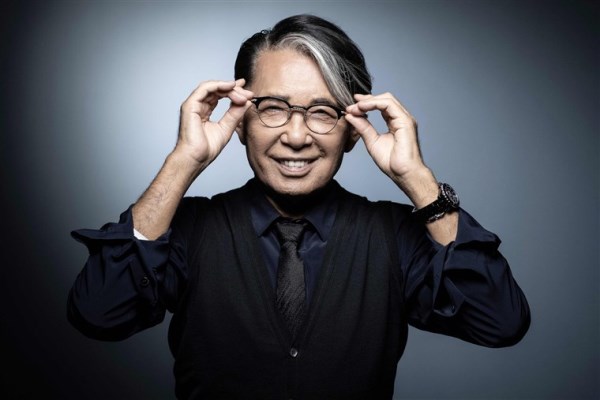Tributes have poured in from all across the world for Kenzo Takada who died at the American Hospital in Paris.
Known for his bright graphics, jungle inspired prints and eclectic use of colour, he was the first Japanese designer to gain prominence on the Paris fashion scene.
He settled in France in the 1960s and spent the rest of his career there.
With his “nearly 8,000 designs”, the Japanese designer “never stopped celebrating fashion and the art of living”, his spokesman said.
Paris Mayor Anne Hidalgo paid tribute to him on Twitter: “Designer of immense talent, he had given colour and light their place in fashion. Paris is now mourning one of its sons.”
“I was a fan of the brand in the 1970s when he started. I think he was a great designer,” fashion news website WWD.com quoted Sidney Toledano, CEO of luxury conglomerate LVMH which owns the Kenzo brand, as saying.
The rebirth of Japanese design
Many Japanese Twitter users posted their condolences on the platform, some of whom shared that their first ever luxury product was one from Kenzo.
“The first wallet I ever owned was from Kenzo,” said one Twitter user. “Even though it’s a small thing – I’ll always remember it. Rest in Peace.”
“I have a Kenzo [outfit] passed down from my mum,” said another. “I still wear it.”
Many others said they owned Kenzo handkerchiefs – an accessory which is still popular in Japan.
‘Ahead of his time’
Born in 1939 in Himeji, near the city of Osaka, Kenzo Takada decided to make his way by boat to Paris in 1965, despite hardly speaking any French.
At first he sold sketches to fashion houses but later decided to strike it out on his own, with a small store called Jungle Jap.
“I decorated the shop myself with little money,” Takada told the South China Morning Post newspaper recently, in what was one of his last media interviews. “One of the first paintings I saw in Paris and fell in love with was a jungle painting… and that was the inspiration for the shop.”
His clothes were heavily influenced by Japanese designs. Takada said he didn’t want to “do what French designers were doing”.
“His native Japan remained [the] source of inspiration for every collection he did. He kept the use of vibrant colours and volumes present at all times,” said Circe Henestrosa, head of the school of fashion at Singapore’s Lasalle College of the Arts.
“I think he was ahead of his time and was one of the first designers to experiment with the idea of genderless fashion. He would never conform to the stereotypical idea of masculine and feminine fashion,” said Ms Henestrosa.
Takada’s “big break” finally came when fashion magazine Elle put one of his looks on their cover, and when international fashion magazine editors attended his fashion show in 1971, he told SCMP.
Controversial name
There was controversy over the brand initially, as Takada had called himself and his label “Jap” – a term that some in the United States found offensive, which he discovered when he started reaching out to the American market.
“I knew it had a pejorative meaning,” he told the New York Times in a 1972 interview. “But I thought if I did something good, I would change the meaning.”
Takada rechristened the label with his first name – and thus Kenzo the brand was born.
It flourished and became an internationally known fashion label, adding a menswear line in 1983 and then more casual sportswear lines Kenzo Jeans and Kenzo Jungle. Kenzo fragrances and eyewear soon followed.
Then, at the height of the brand’s success in the 1990s, Takada sold it to LVMH.
“The hardest year of my life was 1990, when my life partner Xavier died and my business partner had a stroke,” he told SCMP. “That’s why I sold the company to LVMH [in 1993]. I felt I couldn’t do it on my own.”
He stayed at the label for a few years and retired from fashion in 1999 at the age of 60.
But even in his retirement he remained active creatively, designing costumes for opera productions and taking up painting.
“He was supposed to be in Paris only for two years [but] spent the rest of his life there. He took Paris by storm,” said Ms Henestrosa.
“As [fashion journalist] Suzy Menkes said, ‘he wanted to make happy clothes’. His work was avant-garde… it is sad when creative minds like Kenzo leave this world.”








